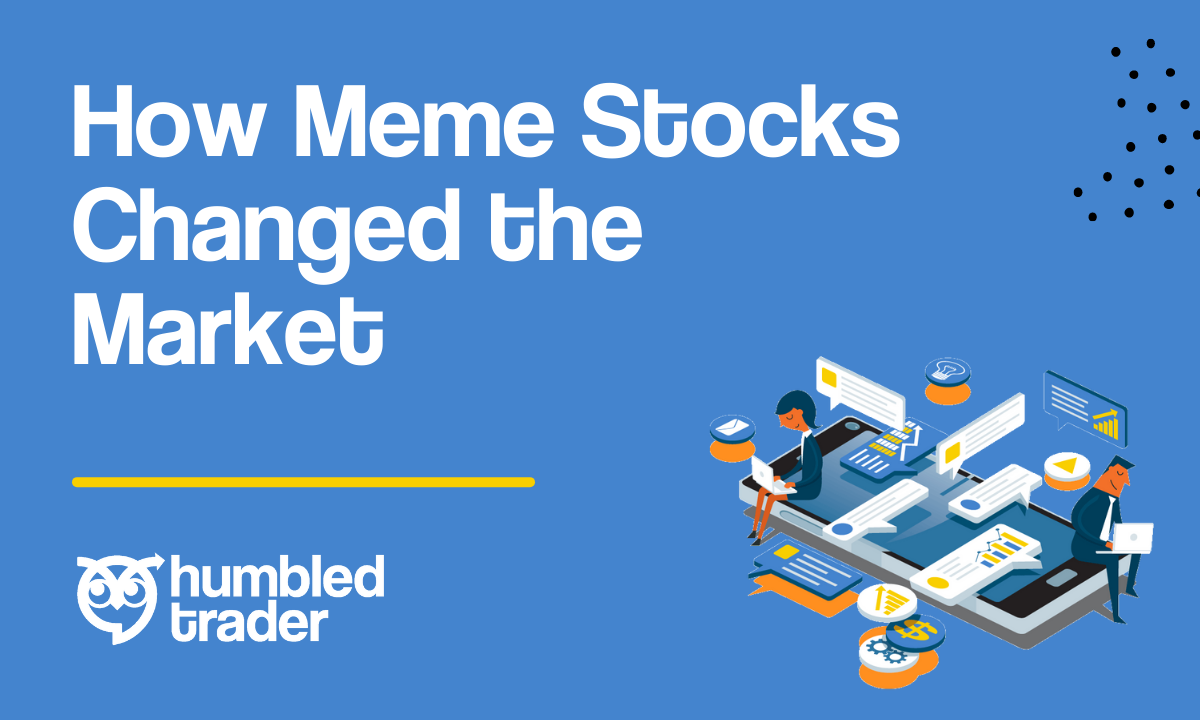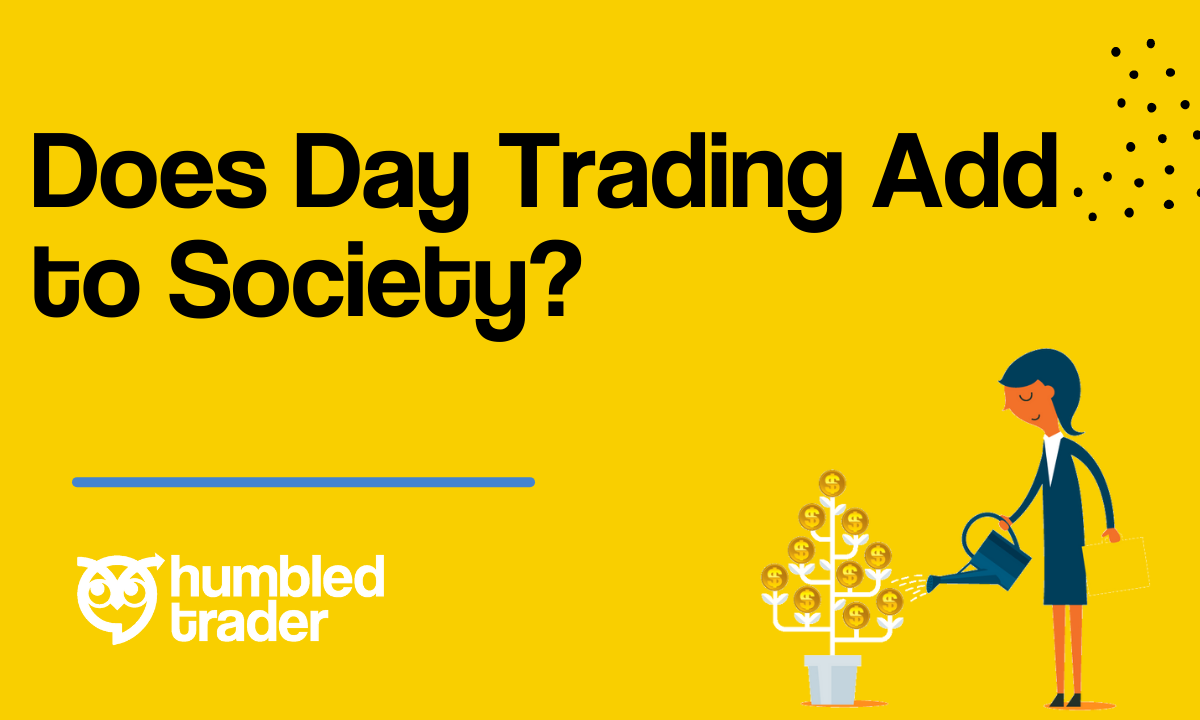How Meme Stocks Changed the Market

In the current uncertain market in 2022 with the bearish market trends, high inflation and rising interest rates… I cannot be the only retail trader and investor thinking… “Man, can we bring back the hype we had in 2021.”
It’s hard not to reminisce about all the crazy momentum runs like Gamestop, AMC and many other retail favorites. I had never been so excited to wake up at 4 am Pacific Time every morning and run straight to my computer to get the ball rolling.
So I must say here, make meme stocks great again!
While the hype seems to have died down significantly in 2022, let's not forget the impact stocks like GME and AMC have had on the entire stock market and on many retail investors' bank accounts.
In this article we will take a leisurely walk down memory lane, take a look at the aftermath of the Wallstreet bets movement, and see how meme stocks have forever changed the stock market.
As someone who's been day trading for more than 7 years now, I can tell you this, while history doesn’t repeat itself exactly the same, it often rhymes. The next time another stock market hype comes around, you can be even more prepared to profit.
What is a Meme Stock?
To start discussing this topic, we must first understand, what exactly is a meme stock?
While we know the word meme to mean something funny on the internet, it originally came as a term used in evolutionary biology. Science! Who would have guessed?
In short, Richard Dawkins (1976) in talking about how people pass on their genes needed a word to describe not passing on genetic material, but instead passing on an idea.
Dawkins was going to borrow the Greek word for imitation (mimeme), but wanted something shorter that reminded people of the word gene and he decided on meme.
Most of us who know the word meme, know it as a humorous image or video that we find on the internet, usually on some social media like FB, Twitter, and what all the cool kids are on… TikTok. By the way, please make sure to follow me there if you haven't already.
These funny images and videos called memes usually end up being imitated/copied over and over again, like the infamous shiba inu doge memes.
That’s how we ended up here on meme stocks. A meme stock refers to the shares of a company that have gained a cult-like following online and through social media platforms, in this case, Reddit and more specifically /r/wallstreetbets.
People on the subreddit started out treating them as jokes and put money into these stocks, OR should we call them… STONKS for fun! That's exactly what the OG meme stocks like GME and AMC were.
Don’t get me wrong… they are and were still real stocks, but these companies, AMC and Gamestop, weren’t exactly something you would ever want to invest in for long-term growth.
In other words, if I were to put it nicely… these stocks have questionable fundamentals. As someone who is more direct would say… they were absolute pieces of sh**.
However, these meme stocks gained a huge following because they were essentially imitations, or copies, of what you would spend your money on in real life. For example, shopping and spending time at Gamestop was nostalgic for many of the 80s and 90s kids with their Pokémons, Nintendos, and video game trade-ins.
Much like how we all find memes to be funny, a lot of people invested their money in these stocks for funsies. Little did they know, these Stonks were about to change the stock market… and pretty much the world.
Meme Stock History
In August 2020, YouTube persona Keith Gill, a.k.a. Roaring Kitty, a.k.a. DeepEffingValue, on Reddit posted research on Wallstreetbets and subsequently a viral video showing how GameStop Corp. (GME) could potentially increase from $5 to $50 per share.
He explained that the stock had some of the highest short interest on Wall Street. This meant that it was a stock with a lot of major hedge funds short-selling it to the ground and milking every single cent out of this declining stock. Because they knew like everyone else that GME was a piece of **** stock.
A quick reminder for those who are not familiar with short selling… when you short a stock, you are betting that the stock prices are going lower because the underlying company’s business is failing. You are essentially betting against a stock.
This is the reason big hedge funds, specifically Melvin Capital, was shorting GME, because it still operated as a brick-and-mortar business in an age where internet-based shopping dominates the world.
DFV went on to describe a short squeeze scenario where all the hedge funds with short positions in GME would need to cover their short positions if a short squeeze happened, which would mean their buying to cover would cause a massive rally in stock prices.
For months, no one took DFV’s research on Gamestop seriously, because c'mon who goes to the store to buy video games anymore? Everyone expected GME to head to the cemetery just like Blockbuster.
However, as the GME stock price slowly crept up from $4 to $10 and set in higher lows near the end of 2020, the stock had gained more and more following on Wallstreetbets.
Remember, many people started out thinking about this thesis and this stock as a joke, but the prices don’t lie. More and more retail investors were drawn into this meme stock and guess what, this meme was turning into a reality.
In January 2021, the short squeeze that DFV said could happen, actually happened. GME shares erupted to nearly $500 amidst the frenzy of hedge funds covering their short positions and FOMO-ers buying the breakout.
What happened immediately during and after the GME short squeeze was some of the wildest times I’ve ever seen in the stock market, and I've seen a lot over the last 7 years with all the crazy short squeezes.
For example, the shipping stocks led by DRYS went from $1 to $100 in 2016, and the blockchain hype like LFIN in 2017 went up a couple of thousand percent. Yes, those were crazy times too, but they were low float penny stocks that the mainstream never knew about, not major brick-and-mortar businesses from our childhood like Gamestop or AMC!
As you can see, it's not an exaggeration to say the OG meme stock like GME changed the stock market. It also woke up many subsequent runs in other meme stocks like AMC, BBBY, and NOK.
Not every retail investor made money… because as we know, many are still holding on to these meme stocks as they slowly declined at the end of 2021 and into 2022. I personally know many people who are still holding on… my ex-husband Mike Bagholder would be one of them.
Big Dogs vs Retail Investors
However, this whole meme stock movement started out with GME having a lot more significance than just the surface-level monetary gains.
There’s always been this division in the Stock Market between the Big Dogs and the Retail Investors. The Big Dogs are the hedge funds and market makers that have billions of dollars. They have so much power on Wall Street that they could manipulate the market and make it do whatever they want it to do, such as naked short selling, activist investing, coordinating PR’s and the list just goes on … because they have the monopoly (or close to it) in the stock market.
The Retail Investors are you and me. We don’t work on Wall Street in some high-rise offices for some big financial firms. We are at home trying to carve out a life for ourselves. Most of us study, invest, and trade in the stock market part time, and often we’ve been subject to market manipulation and lost our money when the Big Dogs bully their way around. We’re often known as the Chump in the Room.
With this meme stock movement, so began this kind of David and Goliath story. The Reddit subgroup /r/wallstreetbets rallied the little guys across the globe and wanted to stick it to the Big Dogs, the Goliaths in the industry.
None of the Big Dogs thought that this would work. Nobody took retail investing/trading seriously until after the GME short squeeze. Even Citron Research, often known for their prophet-like bearish predictions in the stock market, quickly dismissed this movement and called these little guys, "the suckers at this poker game."
Instead, what happened was GME started surging as the little guys, the retail ”investors”, started to pile on shares of GME in an attempt to make the hedge funds cover their short positions.
They were doubling and tripling their positions by the day and chanting “diamond hands," "to the moon," and making it rain “tendies”.... making my raining Lamborghini jokes shy in comparison. Hey, I gotta give it to these people… I’d pick fried chicken over my imaginary Lambos anytime, too.
These retail investors knew these meme stocks were dog crap, but no one cared. If anything, that made it even more fun for them. At the time many said, “Who cares, this is all the free stimulus money the government keeps sending me, so easy come, easy go.”
Aftermath
What transpired really changed the market forever. And here is the aftermath of this retail movement…
Citron, the short-selling oracle of Wall Street shut down its short-selling publications online as a result of their aggregated losses from the GME short. Melvin Capital, one of the most elite hedge funds, had to be bailed out by two other firms.
However, I know what the real million-dollar question is here. Have retail traders taken over Wall Street? Unfortunately, no. Far from it. The Big Dogs still sit high up there on WallStreet.
What did happen is that Wall Street learned it could no longer afford to dismiss retail traders as the buzzing fly in the room. They sure learned an expensive lesson; there is strength in numbers and persistence.
The original WallStreetBets had more than quadrupled in size from less than 2 million prior to 2020, to over 11 million. Retail traders and investors have forever solidified their place on Wall Street and are now recognized as a force to be reckoned with.
As for the meme stocks… Where are they now over a year later?
Well, sadly in the toilet, where most of their fundamentals truly belong. However, many stock prices now are still a lot higher than they were before this movement started, thanks to the diamond hand investors.
Most people saw this time period as a revolution, and that’s exactly what this was. It was a movement, a statement that retail will not be ignored. However, the movement should not be taken as good financial advice.
Let’s keep in mind that GME and AMC and the Wall Street Bets movement was just that–a movement. Diamond handing is not real trading or investing. While a holding and hoping strategy worked for a short period of time, it is not repeatable day after day and year after year for professional traders.
Don’t feel like reading? Watch the video.




